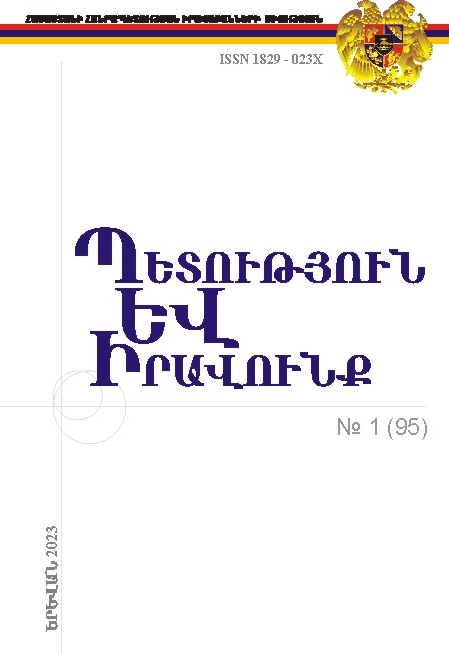TYPES OF LEGAL POSSIBILITIES AND THEIR FEATURES
DOI:
https://doi.org/10.46991/S&L/2023.95.005Keywords:
Law, legal possibility, real possibility in law, formal possibility in law, general (abstract) possibility in law, specific possibility in law, actual possibility in law, necessary possibility in law, random possibility in law, legal reality, social reality, legal phenomenon, realization of law, philosophy of lawAbstract
The need to analyze the main types of legal possibilities is of great methodological importance for a number of reasons. In particular, in the process of the analysis, the legal prerequisites that underlie the patterns of development of legal phenomena and realities are considered and highlighted, thanks to which it becomes possible to understand the structure of the realization of law. In addition, the allocation of certain types of legal possibilities is of great practical importance for ensuring fundamental human rights and freedoms. In the article, the author, based on common features and signs of different possibilities in law, classifies legal possibilities into the following main types: real and formal, general (abstract), specific and actual, necessary and random legal possibilities.
The author considers the listed legal possibilities in terms of the close relationship between the philosophy of law and legal practice (realization of law), and also pays special attention to the problem of the correlation of the general (abstract) and specific possibilities in law, using the example of the constitutional norms of the legislation of the Republic of Armenia.
According to the conclusion presented in the article, a deep analysis of the main types of legal possibilities makes it possible to manage the process of turning the theoretical as possibilty into practical as reality, with a way of the optimal and most effective legal regulation of the relevant social relations.
Downloads
Published
Issue
Section
License
Copyright (c) 2023 State and Law

This work is licensed under a Creative Commons Attribution-NonCommercial 4.0 International License.

